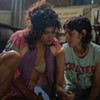Published October 15, 2008 at 5:15 a.m.
Politicians like to talk about the working poor, but Hollywood usually leaves them alone. Maybe it’s hard for well-paid screenwriters and directors to convey the details of a world so remote from their own. Or maybe audiences prefer the other end of the spectrum: It’s human nature to indulge in harmless fantasies about owning a Manhattan penthouse — even, and especially, when you’re worried about paying the mortgage on your own modest home.
All the same, if there was ever a time for a dose of a different reality in movies, this is it. Frozen River, written and directed by Courtney Hunt, delivers the kind of story we rarely see on screen, though the milieu of the film — shot in Plattsburgh and set in Massena, New York — won’t look strange to local viewers.
Melissa Leo plays Ray Eddy, who barely makes enough working at Yankee Dollar to support life in a trailer park with her two sons. Her husband ate up her funds with his scratch-card habit, and now he’s taken off, probably to Atlantic City. But he’s left his Dodge Spirit behind, and when Ray follows it to the parking lot of a bingo parlor on the nearby Mohawk reservation, she discovers a new source of income. Lila Littlewolf (Misty Upham) knows a Canadian who will pay her to transport foreigners across the frozen St. Lawrence River into the U.S. All she has to do is pop the trunk and keep her mouth shut. But she needs a car, and she knows once they’re off the reservation, the smugglers are less likely to be stopped with a white woman at the wheel.
The two women join forces — though not before each has held a gun on the other. Lila’s description of smuggling illegals through the reservation as “free trade between nations” sounds OK to Ray, who desperately needs money for her down payment on a double-wide. Meanwhile, Ray’s teenage son T.J. (Charlie McDermott) is embarking on his own life of petty crime.
Hunt takes pains to show that these people smuggle and steal only to provide for others. Ray won’t let T.J. get a low-paying job because she wants him in school, while T.J. turns to illegal work because he knows his mom won’t be able to buy his little brother what the kid wants for Christmas. Even Lila, who initially comes off as a badass, really just wants to save up enough money to support her infant son.
But the writer-director tries so hard to absolve her characters of blame — with the possible exception of the Canadian strip-club owner who shoves scared Chinese girls into Ray’s car — that the story feels a little programmatic. As Hunt captures the grim world of these characters in tight close-up after tight close-up, it almost seems as if she wants to make sure we don’t get the wrong impression. That means staging some sequences that are predictable and a touch moralistic, such as the one where Ray takes a Pakistani couple across the river but dumps their luggage, fearing it might hold a bomb. (Later, she’s punished for her careless stereotyping.)
With the wrong actors, this simple story might have come across as simplistic. But Leo, who used to be a regular on “Homicide: Life on the Street,” is one of the few Hollywood actresses who can play a trailer-park single mom without looking like she’s congratulating herself on the transformation. If you ran into her putting $10 in her tank at the local Cumby’s, you wouldn’t look twice. Upham, a Native American from Montana with a brief acting resume, leaves perhaps an even stronger impression as the surly Lila.
Hunt clearly knows a lot about the overlapping worlds of Mohawks on the reservation and their poor white neighbors. If she’d written a less by-the-numbers script and allowed the actors more freedom to flesh out their characters, Frozen River would be a landmark. What it’s missing, oddly enough, is any sense of what these people fantasize about, what they dream, how they escape from their difficult lives.
For many of us, of course, movies are all about that escape. Hunt’s award-winning film reminds us that sometimes they can teach us something about the quiet struggles happening in our own backyard.
More By This Author
Speaking of Movies, movie Review
-

Next Month Brings the Final Curtain for Palace 9 Cinemas
Oct 27, 2023 -

Book Review: 'Save Me a Seat! A Life With Movies,' Rick Winston
Aug 30, 2023 -

Steve MacQueen Named Executive Director of Vermont International Film Festival
May 22, 2023 -

Vermonters Are Going Back to the Movies — Under the Stars
Aug 26, 2020 -

Where to Catch a Movie Near Burlington
Sep 11, 2018 - More »
Comments
Comments are closed.
From 2014-2020, Seven Days allowed readers to comment on all stories posted on our website. While we've appreciated the suggestions and insights, right now Seven Days is prioritizing our core mission — producing high-quality, responsible local journalism — over moderating online debates between readers.
To criticize, correct or praise our reporting, please send us a letter to the editor or send us a tip. We’ll check it out and report the results.
Online comments may return when we have better tech tools for managing them. Thanks for reading.












































